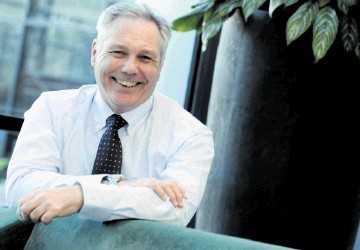
It is a bit like painting the top floor of a house through the letterbox is how Ian Burdis describes his job.
His career in drilling has been more like a ride on a rollercoaster, however, driven by the peaks and troughs of the oil price.
Neither issue much flusters the 55-year-old executive vice-president for energy service firm AGR in the UK, west Africa and Asia Pacific. Working out of Aberdeen, he is as busy as ever.
In the past two months, he has been on 14 trips for work, including to Israel, Oslo, Houston and London, but there is still time for holidays and sports cars.
“We are a bit of a petrol-head family,” he said, listing the cars owned by himself and partner Debbie Kerr: his Lancia Delta Integra, her 1989 Porsche 911 and the day-to-day BMW, plus motorbikes: a VFR and BMW tourer.
He added: “We like going to watch motorsport and driving on the roads here, going to the west coast and – in a group – to Le Mans on an eight-day trip.”
Petrol, or the substance it is made from – crude oil – was not always going to be part of his career, however. Born in Sunderland, his father was an engineering manager in a local shipyard at a time when the city was the biggest for shipbuilding in the world and dominated by extraction industries.
Mr Burdis said: “It was a busy place in the 1960s. It was described in the 1880s as like Klondike (the 19th-century gold rush town in Alaska).”
But he did not go into shipbuilding or mining, on the insistence of his father, and went instead to Manchester University to study geology without much thought of a career.
On graduating, he took a job as a trainee drilling contractor with a firm which happened to have onshore work near to the family home, and his career was set. Five years later he was offered a job at Burmah Oil Exploration, with the intention of working in Gabon but instead ending up in Aberdeen to deal with an offshore well; one of the first central Graben high-pressure, high-temperature wells, which took seven months to drill.
In 1986, the firm was sold off by Burmah and 136 people laid off, Mr Burdis included.
After a stint as a consultant, working for Arco and BP, he joined Amerada Hess. Amerada grew over the next eight years to about 600 staff in the North Sea and at one point had 13 rigs running simultaneously in the area.
Mr Burdis said: “It was great fun. I got to see one field, a two-well development, through from appraisal to production and then abandonment over a two-year period.”
After rapid expansion at Amerada, he went to another small firm building its North Sea presence: Kerr McGee.
From a workforce of 22, it bought Oryx Energy and went to about 400, said Mr Burdis.
He added: “It is quite fun going through the growth pains. There are always exactly the same issues but companies need to learn.”
After a move to a more commercial role at GlobalSantaFe, he moved to Aberdeen firm Peak Well Management as operations director. Just under two years into the job, the firm was bought by AGR.
Employing about 80 people out of Union Plaza, Norwegian-owned AGR effectively acts as an outsourced department for oil and gas operators, offering well and reservoir-management, training and seabed intervention.
The well-management unit has seen the majority of its work carried out overseas this year, while reservoir management has been busy in the UK and internationally, as has training, including a new contract with BP Iraq. Seabed intervention is looking to move into renewables and decommissioning.
The firm has its eye on newer basins, such as Israel and west Africa, having already made a name for itself in the Falkland Islands, where it was running drilling and logistics for Rockhopper Exploration and Desire Petroleum and is already working on further work there with the Leiv Eiriksson rig operating in the region.
But Mr Burdis does not mind the travelling, either at work or in leisure time. He said: “We (he and Debbie) usually head off somewhere long distance; New Zealand, Australia, Vietnam or Peru. We visited the Galapagos, that was pretty special. Machu Picchu, you see the photos but to actually stand there . . .”